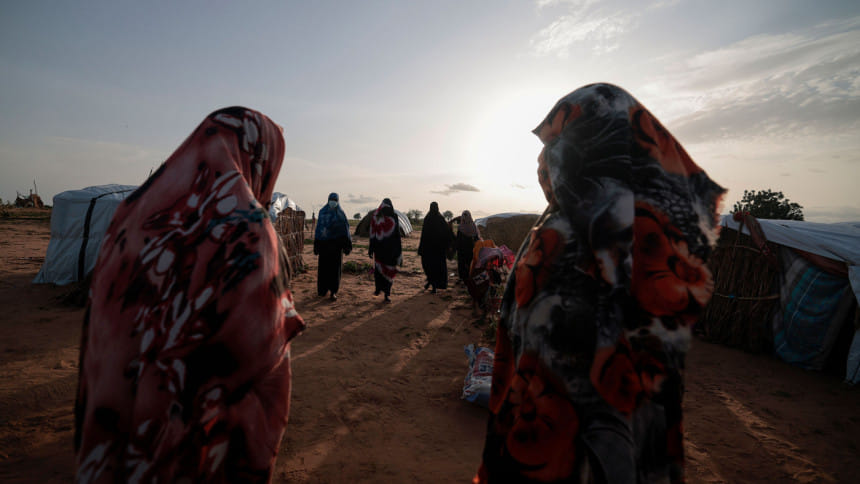The most pervasive human rights violation

It is with both a sense of purpose and profound sadness that we pen this op-ed for the 16 days of activism to end gender-based violence (GBV). Purpose, because eliminating violence against women and girls is important for the future of Bangladesh, for its progress and sustainable development. Profound sadness, because we have so far to go, and we are progressing so very slowly.
Data shows that almost three in four married women in Bangladesh report experiencing violence in their own homes, a place that should be a safe haven. Half of Bangladeshi girls are married before the age of 18, and 84 percent have experienced sexual harassment. Sixty percent Bangladeshi women consider public transport one of the most unsafe places for them. In the current digital era, technology-enabled online violence and harassment is disproportionately affecting younger women, as well as transgender and gender-diverse individuals. The climate crisis is exacerbating intersecting vulnerabilities. We hear of an increase in violence against women and child marriage as a result of climate-related displacement, extreme weather events, and interrupted livelihoods.
Violence against women and girls remains the most pervasive breach of human rights in the world, a barrier to development, and a threat to peace and security. It knows no boundaries of age, race, religion or social status. Globally, it will take another 286 years to achieve gender equality, according to the Gender Snapshot Report 2022. The Sustainable Development Goal (SDG) 5 on Gender Equality seems like a distant dream. But this isn't only about SDG 5; no country can progress if 50 percent of its population feels unsafe, disempowered, discriminated against, and unable to make choices and meaningfully engage and contribute. All the SDGs are at risk.
This year's campaign focuses on scaling up investments to eliminate gender-based violence. As the UN family, we are supporting the Government of Bangladesh and civil society on both prevention and response. We want to share four urgent priorities:
First, a strong, effective, and supportive legal framework is critical. The Government of Bangladesh has made commendable efforts in putting in place a strong normative framework and continues to expand on these efforts. We applaud the Ministry of Women and Children's Affairs for their initiative to amend the Domestic Violence Act, and to articulate a law on prevention of sexual harassment. Implementation and monitoring of laws on elimination of violence against women is just as crucial. Effective enforcement and accountability mechanisms must be part of the investment along with relevant disaggregated data collection.
Second, preventing GBV requires investments in the transformation of harmful social norms and practices. It is essential to allocate resources for planning and implementing interventions that address the root cause, such as transforming power dynamics and challenging social norms that perpetuate gender inequalities. Without adequate investment in prevention efforts, the high prevalence of GBV will persist.
Third, we require comprehensive and effective survivor-centred and age-responsive quality care for survivors of violence. Services for women and girls experiencing violence can be the difference between life and death. The role of law enforcement and medical professionals—including doctors, community health and social workers—is critically important in ensuring quality care. They must work in seamless coordination with the law enforcement and justice system actors to support survivors.
Fourth, investing in Bangladeshi women's organisations is important. Globally, under one percent of gender-focused state aid is directed to women's organisations. Going forward, the Bangladesh women's movement must be adequately funded and supported. Bangladeshi women's rights organisations have a powerful history, and they have always been at the frontline of service delivery and advocacy. There is more proof than ever that violence against women and girls is preventable. Evidence shows that the single most important driver of policy change is a strong and autonomous women's movement.
Investments are not only about funding, but also as much about where we place our attention. Let us pay attention to the issue of gender-based violence not only throughout these 16 days, but throughout the year, every year. Let us collectively push forward to end violence against women and girls once and for all.
Gwyn Lewis is resident coordinator of the United Nations in Bangladesh.
Kristine Blokhus is country representative of the United Nations Population Fund (UNFPA) in Bangladesh.
Gitanjali Singh is country representative of the UN Women in Bangladesh.
Views expressed in this article are the authors' own.
Follow The Daily Star Opinion on Facebook for the latest opinions, commentaries and analyses by experts and professionals. To contribute your article or letter to The Daily Star Opinion, see our guidelines for submission.


 For all latest news, follow The Daily Star's Google News channel.
For all latest news, follow The Daily Star's Google News channel. 










Comments